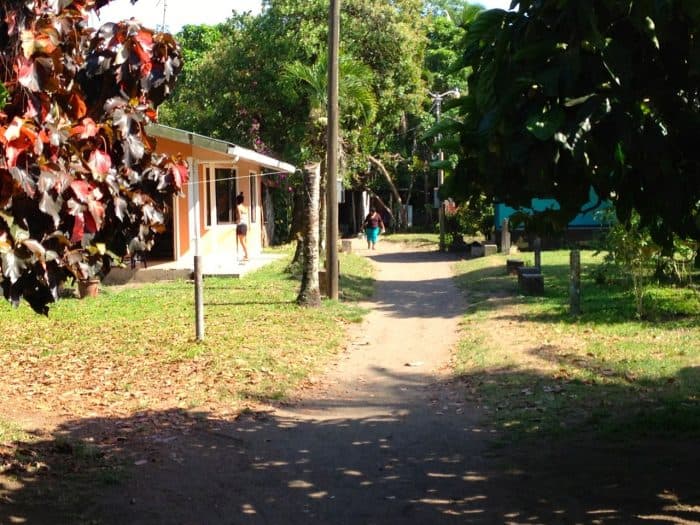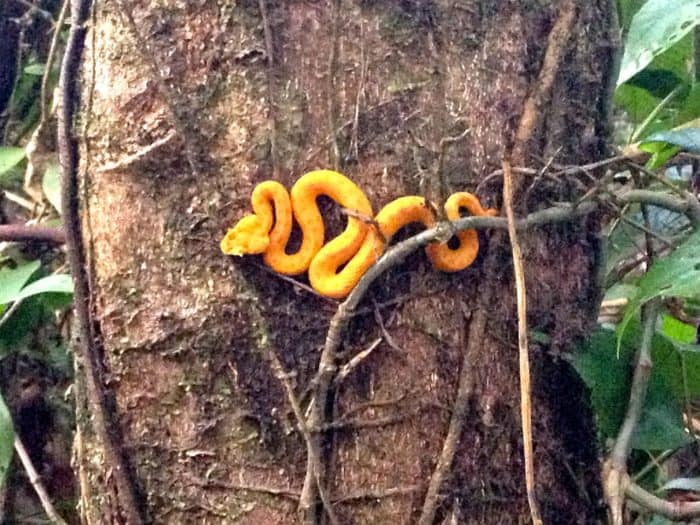When the riverboat hummed its way to the dock, the sky was navy blue. It was 5:15 a.m., and dawn had not yet broken over the dense forests of Tortuguero. A crowd of people waited on the bank, and as they climbed aboard, dumping their bags and taking seats, it was clear there wouldn’t be space for all of us.
“They’re getting another boat,” one backpacker called to the rest of us.
We all nodded. There was nowhere to buy coffee, and most of us were deliriously tired. My wife and I sat on a bench, watching as boatmen pushed the craft free, using a two-by-four for leverage. The river rippled beneath the hull, the outboard motor roared to life, and the dark water boiled around the stern. Within minutes, the boat had vanished into a fine mist.
I scanned the horizon. The sky bloomed red around the silhouette of canopy. There was no sound but the call of birds. The scene was tranquil – just as you’d expect of a remote village in the heart of a rain forest. But I was uneasy. I didn’t worry about jaguars or pit vipers or caimans. I knew they lurked out there in the black woods, but they didn’t trouble me. We had stood within arm’s length of deadly animals only the day before. No problem.
My fear was pirates.
I wanted to take my wife Kylan to Tortuguero for her birthday, because friends had gushed about the region and Nature Air was running a promotion on one-way flights. We could fly there for cheap, stay in a quaint cabina, walk around the village, and paddle a canoe through the legendary canals. It wasn’t turtle season, so we couldn’t expect to see our first leatherback, but if we liked Tortuguero, we could always come back in September. In the end, we would take public transit back to San José. Perfect.
Before I left, I mentioned our itinerary to my friend Zach. His smile faded. “You’re not taking the bus back, are you?”
“Yeah. We’re flying in and bussing out. Why?”
“Are you going through Cariari?”
“I think so.”
“Oh. You know about…” He hesitated. “You know about the robberies there, right?”
“I heard about that. But they happened awhile ago, didn’t they?”
Zach is a journalist who frequently writes about crime for The Tico Times, and he related what he’d heard: Because there is no road to Tortuguero, departing tourists must ride riverboats through the canals until they reach a parking lot. From there, a bus takes passengers down a narrow road toward the town of Cariari de Guápiles.
The region is filled with banana plantations, and according to reports, farmers occasionally open their large gates and forget to close them. This causes the buses to stop, and when they do, masked men have leapt out of the foliage and threatened the drivers with pistols. They stick up the tourists, steal their valuables and flee into the fields.
“But I’m sure you’ll be fine,” Zach said tentatively.
This was not the first bad news I’d heard about Tortuguero. Last December, three masked assailants overtook a riverboat and robbed 14 people aboard. Technically, it was an act of piracy, and the attackers were never brought to justice. The event was so shocking that locals were worried about its effect on tourism. Tortuguero has no other major industry, and without its steady influx of backpackers and eco-tourists, the town could see a serious decline.
Meanwhile, Tortuguero is located on the Caribbean side of Costa Rica, where crime statistics are most unnerving. We have spent a great deal of time in the country, but we had never visited the Caribbean coast. Kylan’s birthday would be our first venture. The last thing I wanted was to have our weekend ruined by a gang of pirates in ski masks.
If we hadn’t known about Tortuguero’s crime wave, the village would have seemed perfectly sweet. The first thing they tell you is that Tortuguero has no cars, but really there are no motor vehicles at all. No motorcycles rumble. No trucks or jeeps jostle down the way. Instead of streets, the village is crisscrossed with narrow dirt paths.
I had heard of places like this, and as someone who hates driving, I loved the idea. But walking those paths in person was a strange experience. The only engine noise came from the river, where boats hummed across still water.

We also noticed the multitude of roving children, who pedaled bicycles and ate ice cream in the playgrounds and generally seemed as carefree as the exotic birds. Even in the middle of the night, kids would wander around in their dust-matted clothes, seemingly unconcerned. If a gangly 10-year-old chiquita felt safe here, why shouldn’t we?
Still, a reputation can cast a shadow over everything, and we couldn’t help but approach Tortuguero with quiet caution. Yes, we signed up for a night hike and ventured into the dark with a small group.
Yes, we rode a canoe into the jungle with our guide, armed with nothing more than handmade paddles. We walked the beach, which was generally empty. We walked the dark paths at night, even after a few beers, knowing full well that an armed mugger could take our stuff and disappear, and we’d probably never catch him. The risks didn’t stop us, but the aura of danger wafted everywhere. Such is the power of a headline.
“They just say it’s dangerous because a boat was attacked in December,” grumbled one tour guide. “That kind of thing almost never happens.”
“I take that route to Cariari all the time,” said his compañero. “Nothing has ever happened. People take that trip every day. It’s very safe.”
The problem was not the probability of crime – which was extremely low – but the very possibility, particularly in such an isolated place. The Judicial Investigation Police (OIJ) has no office in Tortuguero, and although security exists, we had little idea of whom to contact if anything went wrong. One of the biggest complaints on the Caribbean coast is that the police aren’t very effective.
After a shooting in Puerto Viejo wounded five people last November, witnesses said it took officers 30 minutes to respond, and some victims ended up driving themselves to a nearby clinic (they hit a pedestrian on the way). There aren’t a lot of shootings in Costa Rica, and when such violence happens, it becomes major news. (Statistically, Costa Ricans are most vulnerable in their own homes, where domestic violence is alarmingly common). But Ticos and tourists alike tend to lack faith in small town police – especially in a place as sequestered as Tortuguero.
So we took the usual precautions, hiding our passports and deeply pocketing our cash. We spent little time on obscure paths at night. If something happened, at least we’d done our best to stay safe.
Yet I still felt hypersensitive to peril. Early one morning, a tottering man mumbled, “Buenos días” as we passed. Then added, in heavily accented English, “Good morning.”
“Hola,” I said, passing him.
“Hey!” he growled to my back. “Good morning.”
I turned around and faced him. The man was ragged and had probably been drinking all night. “Good morning!” I replied, in my airiest, friendliest voice.
The response seemed to satisfy him, and he slinked away. Normally I wouldn’t care much about a touchy old codger, but because of our vigilance, the moment was jarring.
After a full day with our guide Abel, I finally decided to ask him about crime in Tortuguero. It felt like a tactless question: Is your hometown as crazy dangerous as people say it is? But Abel was forthcoming.
“There has been some crime,” Abel said. “There is a big problem with drugs in Tortuguero. Marijuana, cocaine, and another one. I don’t know the name in English.” He used the Spanish term.
“Crystal meth?” Kylan asked.
“That’s it! Crystal meth. There are a lot of people who use drugs, and they need money. That’s why there’s crime in Tortuguero. So yes, sometimes it can be dangerous.”

We weren’t naïfs, of course. Kylan and I had visited some sketchy places, and we’d had our share of scrapes. We’d been lucky, overall, and grateful for that luck.
The thing is, it only takes one bad moment to cause long-lasting damage. My friend Alejo (not his real name) was born in Costa Rica, but he spent significant time in Mexico City. He recently told me one of the most horrifying stories I’ve ever heard from a close friend: During a walk in a public park with his then-girlfriend and another friend, a man threatened the trio with a gun.
The attacker tied and bound Alejo and his girlfriend, then sexually assaulted their friend. When they notified the authorities, the police were useless. There was no rape kit, no reliable report, not even comforting words. Traumatized and angry, Alejo left Mexico soon after.
“When you talk about traveling alone,” Alejo told me, “I just think, ‘I won’t do that anymore.’ It’s just too much.”
After two action-packed days, we boarded the backup riverboat for Cariari. Color warmed the sky, and individual trees emerged in the forest. We motored down the canal, then veered into a narrow waterway. The muddy banks pressed toward us on either side, and dense vegetation loomed all around. A heavyset man dozed across from me. Belgian backpackers we’d met the night before snapped photos of toucans. Now and again, a submerged tree trunk would scrape along the bottom, or a branch would whip along the gunwales.
I wondered: If someone attacks us what will I do?
Because I’m a Gringo, and I was raised on action movies, I immediately envisioned myself engaged in hand-to-hand combat, trying to wrestle a pistol from a terrorist’s grip. In our battle for control, the gun would naturally go off, blasting a second attacker in the gut and killing him instantly.
There would be lots of punching, until we both tumbled in the water, and a float of caimans would tear the pirate to shreds, eating him on the spot. The backpackers would lift me out of the water, just seconds before a lizard’s jaws ripped my legs from my body.
The fantasy was absurd, but the danger seemed all too real. The creek is narrow, and pirates could shanghai our boat without much trouble. The sight of a gun would freeze us all, and we would willingly do whatever those attackers say. I was almost surprised, after more than two hours of travel, to see the earthen dock, where a queue of smiling tourists eagerly waited to board.
Next we got on a bus, and we rode down the very road Zach had warned me about. Indeed, the road was paved with dirt and barely wide enough for two vehicles to pass each other. I saw the rows the banana trees through our windows, where bunches of fruit were wrapped in protective bags. I should have found the sight pastoral, but I knew that this particular stretch of road was where travelers had been scared out of their wits. Nobody was hurt, I kept reminding myself. Costa Rica isn’t Honduras.
At last the bus pulled into Cariari, a nondescript town with two bus stations. We helped our new Belgian friends figure out their connection, and soon we were riding another bus to Guápiles. The road ahead had no rap, no nightmare tales of highwaymen or ambush.
“I didn’t want to mention this before,” I finally told the Belgians, as our bus bombed down the well-paved highway, “but there have been some robberies on the road we just took.”
“The one back there?” they asked soberly.
“Yeah.” I told them what I’d heard. It sounded so silly now, like a ghost story.
“It seemed all right to me,” said one of the Belgians.
It did. But then again, it always does.






